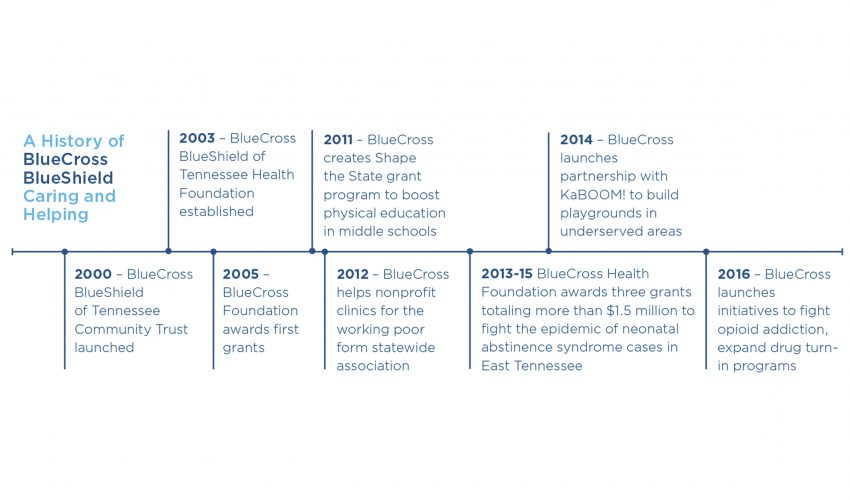Calvin Anderson, senior vice president and chief of staff, began his BlueCross career 22 years ago and has been instrumental in the company’s commitment to engage with and improve the health of Tennessee communities.
He spoke with Better Tennessee about the past, present and future of those efforts.
BlueCross is both active and focused when it comes to social responsibility.
Can you describe that history?
BlueCross BlueShield of Tennessee has been committed to the community from its start in 1945. That part of the original mission is ingrained in our culture.
That commitment is evident throughout the company at the board, senior management and employee level.
It began with community engagement, then progressed to activities that the company sponsored and supported.
It advanced to formation of a foundation to provide philanthropic giving that wasn’t tied to the company’s bottom line or using members’ premium dollars.
With the creation of the BlueCross BlueShield of Tennessee Health Foundation, we could look at projects that can have a longer arc than one year, or even three years, to really affect population health status, not just for people who carry a BlueCross card, but for the entirety of the Tennessee community.

You mentioned that giving back has become part of the company culture.
What does that mean for employees?
One big example is in building 11 community playgrounds across Tennessee over the past couple of years.
We’ve had 862 BlueCross employees put in thousands of hours of physical labor.
Our employees contribute about half a million dollars to United Way campaigns each year.
As individuals and as teams within the organization, BlueCross employees are always involved in giving back to our communities.
When there’s an opportunity to do good, our employees consistently step forward to help.


You have led the social responsibility efforts of BlueCross for years.
What are some of the investments you’re proudest of?
There are a couple that stand out.
One is our physical activity component concentrating on young people, with a focus on schools.
Shape the State grants let individual schools come up with the things they see as best for their own school, and submit a grant request.
Each of the 120 grant recipients so far has received $10,000 of resources to put into increasing activity at their school.
For the 20 middle schools across the state that have earned grants each year, it has been a real boost.
There’s the implementation of GoNoodle in literally every school district across the state, which has elementary-age kids up and moving throughout the day.
It puts both learning and physical activity into one model. This is something that is designed to get kids to be active, and to increase their appreciation and awareness of fitness and exercise.
Stretching out beyond the schools, we have built 11 community playgrounds with the national nonprofit KaBOOM! in economically challenged neighborhoods where children didn’t have physical fitness equipment to play on. And we have more on the way.
We’ve also worked on RiverFit in Memphis and Fitness Zones in Chattanooga, so that we are delivering something to the broader community that has an emphasis on activity.


The BlueCross Health Foundation is primarily focused on three areas: activity, access and fighting addiction.
How did you decide on those themes?
In our strategic planning process, we look to see where we can be most impactful, have the largest amount of collaboration, and build in outcome measurements.
One area we chose to focus on was expanding access to care. That’s especially meaningful for the working poor who didn’t have access to workplace insurance, government programs or the health care marketplace, but who still need medical care.
Our premise was, what could we do with community-based clinics that are already serving this population?
We helped them develop a network of community-based volunteer clinics. And we’ve supported ancillary services, such as providing vision testing for kids in schools, and the Dispensary of Hope, which provides medication to people who might not otherwise be able to afford it.
I also mentioned a focus on our efforts on physical activity. That’s obviously a critical component.
We are also concerned about those who — sometimes without being aware of what is occurring — find themselves addicted to pain medication.


That’s an area where BlueCross has some history, but also new work is underway.
What can you tell me about how the efforts to fight addiction are evolving?
The Foundation has, since 2013, committed more than $1.5 million into research and programs to fight the epidemic of neonatal abstinence syndrome, which affects babies whose mothers used drugs while pregnant.
Now we are expanding our focus to address the widespread problem of pain medication addiction in Tennessee.
We’re working on the prescribing protocol for clinicians and making individuals more aware of what might be occurring with the medications they are taking.
We’re also working on the problem of getting leftover prescription medication disposed of safely and properly, so that it doesn’t fall into the hands of others who might misuse it.
We’ve committed another $1.3 million from the Foundation for this work, and I believe our collaborative efforts will make a real difference for Tennesseans.

“Girls like me aren’t addicts.” Read Sheryl’s story here.
The post Committed from the Start and Racing Toward Results appeared first on Better Tennessee.

